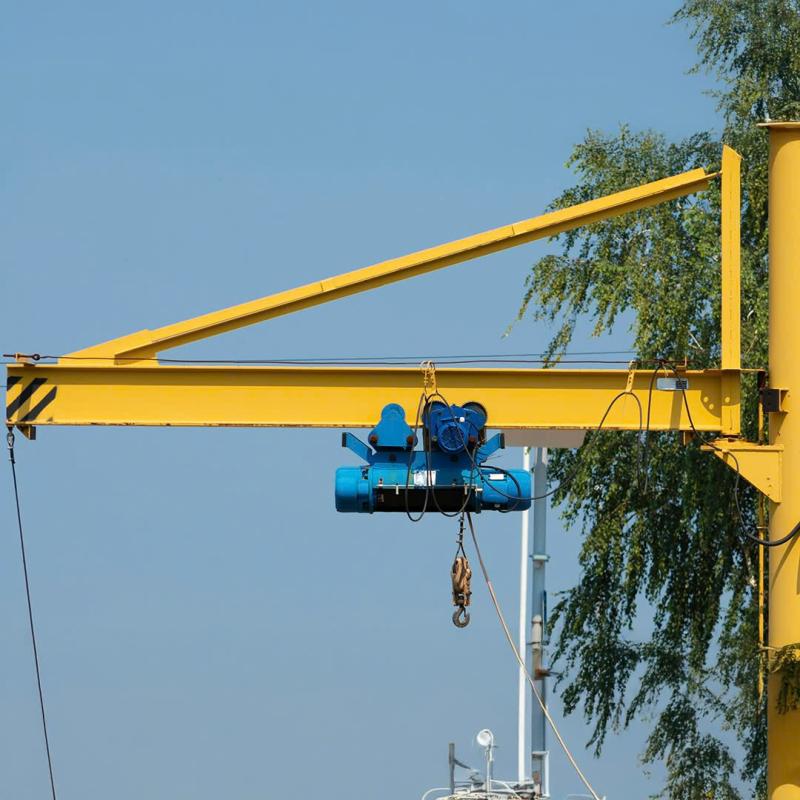



A comprehensive inspection checklist ensures that freestanding, wall mounted, ceiling mounted, articulating, and pillar jib cranes remain safe, compliant, and fully functional in demanding environments.
Whether you operate in manufacturing, warehousing, fabrication, or logistics, regular inspections are vital to reducing downtime, avoiding accidents, and extending crane service life.
To explore real-world lifting applications, browse The Applications of Jib Cranes.
Routine inspections help:
Detect early signs of wear and potential failure
Comply with OSHA and ASME B30.11 safety standards
Maintain safe working environments
Avoid costly repairs and unplanned downtime
To support effective use, ensure your jib crane is installed properly. Learn more about Jib Cranes Installation.
Different jib crane types come with specific operational challenges and inspection points. Here's a quick overview:
Freestanding Jib Crane: Mounted on a concrete foundation, requires base and rotation checks.
Wall Mounted Jib Crane: Bolted to load-bearing walls—critical to inspect wall integrity. Installing wall-mounted jib cranes
Ceiling Mounted Jib Crane: Suspended from beams; overhead anchors and trusses need close monitoring.
Articulating Jib Crane: Explore the jib cranes products for dual-arm pivot inspections.
Pillar Jib Crane: Attached to structural columns, requiring periodic column assessments.
Not sure how they compare? Review the difference between crane and jib cranes for deeper insights.
Conducted by operators before each use to detect obvious hazards.
| Component | Inspection Points |
|---|---|
| Boom & Mast | Cracks, rust, paint deterioration |
| Hoist Hook | Deformation, latch condition, wear |
| Wire Rope / Chain | Fraying, corrosion, kinks |
| Trolley Movement | Smooth travel, abnormal noise |
| Load Labels | Visible and legible weight ratings |
| Power Cords | Frayed cables, loose connections |
| Emergency Stop / Controls | Responsive, no lag or malfunction |
Done by maintenance personnel or trained technicians.
| Component | Inspection Points |
|---|---|
| Bearings & Pivots | Lubrication, smooth rotation |
| Brake System | Effective holding when load is suspended |
| Electrical Systems | Check limit switches, pendant control function |
| Trolley & Boom Alignment | Straight travel path, no wobble or deviation |
| Anchor Bolts (Freestanding) | Tightness, visual signs of fatigue |
Focuses on foundational stability and key moving components.
| Component | Inspection Points |
|---|---|
| Wall/Pillar Anchors | Wall integrity, base plate stability |
| Ceiling Mounts | Load-bearing beam strength, weld fatigue |
| Boom Rotation | Test full arc (180°–360°), ensure free movement |
| Hoist Controls | Load test with 100% capacity |
| Load Chain or Rope | Measure elongation, replace if over tolerance |
Performed by a third-party technician to maintain compliance.
| Area | Details |
|---|---|
| Load Testing | Lift 125% of rated load (per ASME standards) |
| Full Equipment Audit | Document condition, usage logs, component lifespan |
| Replacement Forecasting | Parts nearing wear limit are scheduled for change |
| Safety Certification | Issue updated operation permits and inspection tags |
For installation practices that directly affect inspection outcomes, refer to A guide to apply jib cranes.
| Crane Type | Daily | Weekly | Monthly | Annual |
|---|---|---|---|---|
| Freestanding | ✔ | ✔ | ✔ | ✔ |
| Wall Mounted | ✔ | ✔ | ✔ | ✔ |
| Ceiling Mounted | ✔ | ✔ | ✔ | ✔ |
| Articulating | ✔ | ✔ | ✔ | ✔ |
| Pillar Mounted | ✔ | ✔ | ✔ | ✔ |
Even though inspection needs are similar, mounting surfaces (floor, wall, ceiling) demand unique structural reviews for each type.
Stop crane operation immediately if any of the following are observed:
Broken or cracked welds on the boom or column
Load hook bent or missing latch
Trolley skipping or derailing
Excessive heat from the hoist motor
Sparks, burning smell, or electrical shorts
Audible grinding during rotation
A compliant jib crane inspection plan includes meticulous documentation:
Daily operator checklists signed and filed
Maintenance logs with dates, technician name, action taken
Annual inspection certificates posted near the crane
Repair or replacement documentation for audit trail
Use digital tools or software if managing multiple cranes across departments or locations.
Schedule inspections during off-peak hours
Combine inspection with lubrication and minor adjustments
Train staff to identify and report minor issues before they escalate
Rotate hoist positions periodically to equalize wear on chain and boom
A well-structured inspection routine is the cornerstone of jib crane safety and efficiency. Whether using a freestanding, wall mounted, ceiling mounted, articulating, or pillar jib crane, consistent inspections will not only prevent accidents but also preserve the mechanical integrity of your equipment.
Ensure your inspection plans align with the crane type, operational frequency, and environmental factors. By integrating these checks into your facility’s maintenance system, you extend the life of your cranes and protect your team.
To see which crane suits your operation, explore The Applications of Jib Cranes and review installation standards via Jib Cranes Installation.
References
1. How to operate a Jib Cranes safely
3. Over brace jib crane wall mounted
5. Is a Jib Crane a Gantry Crane
6. Articulated Jib Crane Wall Mounted
8. Manual Counterbalance Crane
10. Over Braced Jib Crane Column Mounted
Sign up to receive the latest info on new Aardwolf products, special offers and more.
By signing up you agree to receive emails from Aardwolf with news, special offers, promotions and other information. You can unsubscribe at any time.